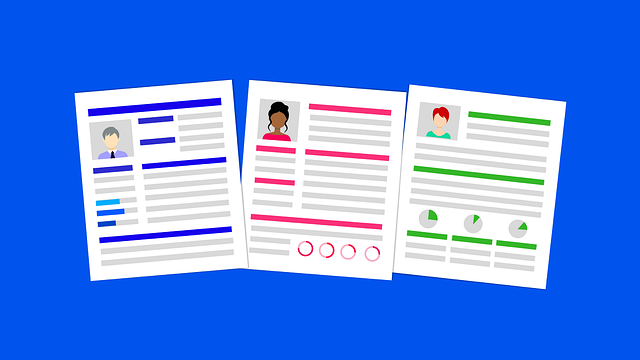
Writing a Tech CV to get Recognised
Posted on:
by Cathal McAliskey
CV Assistance
How often have you found the perfect job, applied online and not heard anything back? In too many cases, good candidates miss out on being shortlisted due to a poorly written CV. In my job as an IT Recruiter, I review many CVs daily, and the bad ones always stick out. Your CV is a chance to make a great first impression, so it’s essential to get it right.
But don’t worry, help is here, and today we are covering how to create a CV to get recognised. Regardless, if you are a new grad or an experienced engineer, I promise the same advice applies. Let's get started!
CV Structure

It's important to tailor your CV to the tech job you are applying to. E.g. If a job advert for a Grad position talks mainly about personality and attitude it’s key to address this in your CV. However, if a Software Engineer advert highlights must-have technical skills then it’s important to demonstrate these skills clearly on your CV. Spraying and praying a generic CV won’t accomplish anything
-
Keep your CV to a maximum of 2 pages
-
Make sure your CV is A4 size and Doc or PDF format
-
Use a professional font throughout like Calibri
-
Explain any significant gaps between jobs
-
Have a consistent layout – Bold, Italics, MM/YYYY
-
You don’t include a photo, this isn’t required in the Irish market
-
Ensure your name and contact details are clear at the top of your CV
-
Dedicate a section to technical skills
-
Use clear headings and concise bullet points to share your experience and tech stack
-
Provide relevant information regarding education, experience, and technical skills, for the job you’re applying for
-
Include courses and qualifications
-
Include hobbies, interests and personal projects
CV Template
If you have an up-to-date LinkedIn profile, I'd recommend using VisualCV to build a great CV and get recognised.
How do tech companies review a CV?
Usually, this starts with a non-technical person from HR doing a keyword scan of your CV. Many will use the Ctrl F command to search for keywords/technical skills. Here they will look for the mention of a key skill multiple times, if a skill is only listed once, they may assume you are no longer using it or only used it during college.
I think it’s essential to not only list your technical skills but explain how you used them during positions or projects. Listing your tech stack beside each role or project will reinforce that you have the relevant tech skills and experience. If your CV has all the technical skills required for the position and you have the right amount of experience, you are likely to get shortlisted for the role.
The next steps are HR forwarding your CV to a hiring manager (likely your future boss) for a 2nd review. They will ultimately decide if you get an interview or not. They will review your CV and look at your roles, responsibilities, and the complexity of your projects. Hiring managers like to see candidates explain projects and detail their tech stack as it helps them to understand your technical ability.
A lot of tech companies use Application Tracking Systems (ATS) to review and shortlist. Technical skills, content and layout are three major components that will affect the selection process. Find out how an ATS will read your CV here.
Can AI screen your CV?

Yes, of course, in my experience AI is becoming increasingly more popular in the shortlisting of tech talent. Application Tracking Systems have built out functionality to shortlist candidates based on keyword and job title searches without any need for human interaction. AI bots follow algorithms (a set of rules) and will shortlist CVs that meet the criteria and reject unsuitable ones with an automated message.
LinkedIn has a lot of built-in AI which recommends jobs to candidates and candidates to jobs when recruiters are headhunting. LinkedIn can pick up your technical skills from your CV attachment on your profile and see if it matches the required technical skills for a job post.
Tips to Prepare your CV for AI screening:
-
List your technical skills clearly in relevant areas, java isn’t a hobby it’s a technical skill/language.
-
Makes sure you mention your key skills often.
For example: If you are a C# Developer but haven’t mentioned it in your last 2 roles, AI can misinterpret a lack of experience or assume that you are no longer using C#. I’d recommend listing your main tech stack beside each position or project.
-
Use a clear professional font.
-
Upload CV as a word document. AI finds word docs easier to read than PDFs.
-
Use full terms, not acronyms, unless commonly used in the tech industry.
-
AI systems are built to search for exact words or phrases, not acronyms. E.g. Use “Kubernetes” rather than “k8s”
-
Be concise with your role description and responsibilities.
-
Use data points rather than long winded paragraphs. E.g. Led a team of 10 people and improved delivery efficiency by 20% over 6 months.
-
Use proper and commonly used job titles.
-
AI will search for common titles to align with these titles to get recognised. Stick to software engineer rather than software rockstar.
For more AI-friendly tips click here.
Common mistakes
As a tech recruiter, I’ve seen a lot of poor CVs over the years. Here are some common mistakes:
-
Listing irrelevant information: You don’t need to include your passport details or explain your part-time job from 10 years ago. Include relevant information for the job you are applying for.
-
Too brief/too long: In my opinion, the perfect length of a CV is 2 pages as it allows you to explain your background and experience concisely. Don’t be the person with the 10-page CV or the person with a pdf of their bare LinkedIn profile.
-
Lying or providing false information: A week doesn’t go by where I don’t have to call someone out for listing technical tools/technologies on their CV that they’ve barely used. Be honest and remember that the skills listed on your CV, will be accessed in an interview!
-
Spelling mistakes: There are no excuses for grammar or spelling mistakes, especially with word’s spell check and Grammarly free to use.
Improving your online profile
My top 3 tips:
-
Many hiring managers or HR staff who screen CVs will usually look for another data point. This can come in the form of an online profile on LinkedIn, GitHub, Stack Overflow, Behance, Dribbble, a personal website or social media like Facebook, Instagram or Twitter. I'd encourage you to keep your online profiles up-to-date and aligned with your CV, especially on LinkedIn.
-
GitHub, Stack Overflow, Behance, and Dribbble can be great places to demonstrate your work and personal projects. These platforms help differentiate you from others, so why not add a link to your CV?
-
My last tip would be to keep your online presence professional. No company wants someone who makes controversial comments on LinkedIn or social media. I’d advise you to keep your social media accounts private and use LinkedIn and other tech platforms to demonstrate your professional background.
Work with a specialist IT recruiter
In today’s tech market many CVs are overlooked, or it can take weeks for a review. In some cases, people receive generic feedback whereas others don’t hear anything back at all. Think about all the time and effort you put into creating a great CV, surely you deserve some constructive feedback.
If this scenario sounds familiar, I’d recommend that you speak with a specialist IT recruiter and here’s why:
-
Recruiters have better relationships with hiring managers, they often speak so they can improve feedback timelines.
-
Getting feedback helps recruiters as well as candidates. With feedback, a recruiter can see if the profiles they have sent are hitting the mark and if not, then understand what they are missing so they can adjust their search.
-
Recruiters and candidates have a common goal. A recruiter supports candidates throughout the process and if the candidate gets the job, then they get a commission. They can also be persuasive in convincing hiring managers who are sitting on the fence.
-
They can help with CV structure, interview prep, and share insights on clients/hiring managers/interview processes.
-
Recruiters can give you up-to-date information on market salaries and benefits.
So, if you’d like to speak with a specialist IT recruiter, contact us, GemPool would love to help. Also, why not check out our careers page to see if any positions catch your eye?






